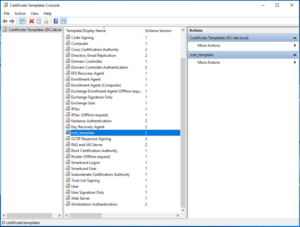The open-source edition is suitable for users who need a simple, no-cost solution for their email server needs.
Table of Contents
What Are Email Servers?
Suggested read: Using Mailgun To Send Transactional Email From WordPress iRedMail is a powerful email server solution offering a free, open-source edition (OSE) and a premium version called iRedAdmin-Pro. It provides comprehensive features for managing email domains, users, and security settings through a user-friendly web interface.Dovecot Pro is designed to deliver unparalleled performance, scalability, and security for large-scale email service providers, such as Telcos, ISPs, and hosting companies. It is an open-source solution that comes in both free and professional versions, with Dovecot Pro offering advanced features tailored to meet the needs of enterprises.
Pros of Hosting Your Own Email Server
If you want to test this out for yourself, you can view the official demo of Poste.io.Suggested read: How To Resolve The “Email Address is Not Verified” Error With AWS SES Self-hosting email servers offer significant cost savings, especially for organizations with many users or high storage needs. It provides unparalleled flexibility, allowing you to create unlimited email accounts and allocate storage as needed.
Cons of Hosting Your Own Email Server
mailcow is an open-source email server solution that uses Docker containers to provide a robust and feature-rich email infrastructure. It combines well-established components such as Dovecot, Postfix, and SOGo to create a cohesive system. This allows it to offer various functionalities, including IMAP/POP3 services, spam filtering, antivirus scanning, and webmail access. Managing your email servers can be time-consuming and complex. Instead of getting bogged down with server management, focus on scaling your operations and leave the technical hassles to the professionals.Suggested read: DKIM – What Is It & Why Your Emails Need It
Best 10 Self-Hosted Email Servers Platforms
Email servers are specialized computer systems that send, receive, and store email messages. They act as digital post offices, managing the flow of electronic mail between users and implementing protocols such as SMTP, IMAP, and POP3 to ensure efficient message delivery and retrieval.
1. Mailcow Email Server
Mailcow also incorporates security features such as two-factor authentication, fail2ban-like protection, and automatic Let’s Encrypt certificate generation, making it a compelling choice for organizations seeking a secure, full-featured email solution that’s relatively easy to deploy and maintain.Creating a free email server is possible using open-source software on a home computer or a free-tier cloud service. You can use software such as iRedMail or Mail-in-a-Box, which automates much of the setup process. However, keep in mind that while the software may be free, you’ll likely still incur costs for domain registration and possibly for a static IP address.
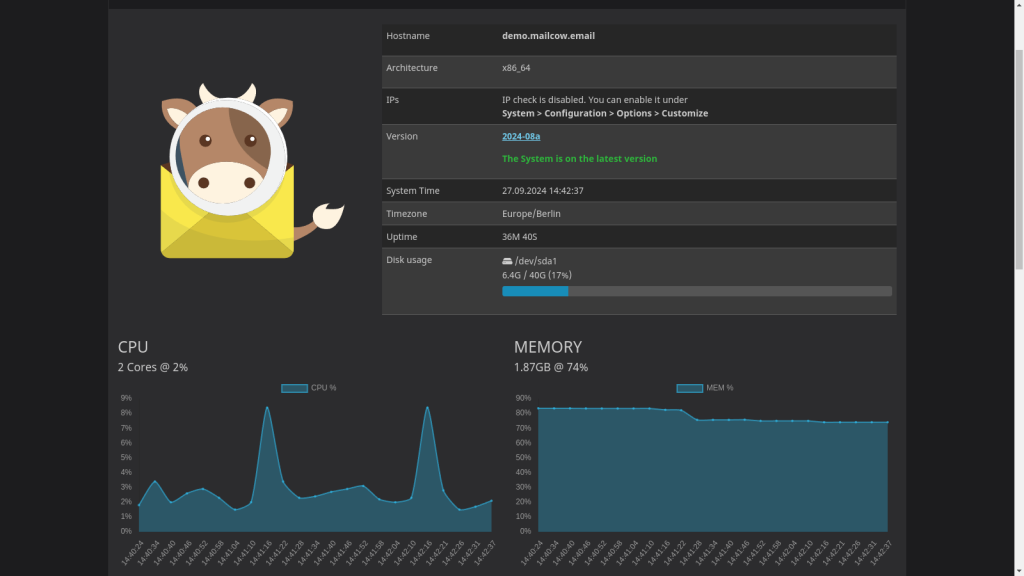
WildDuck Mail Server is a developer-first email server solution designed for scalability, Unicode support, and API control. It is ideal for large deployments with over 1,000 email accounts. Suggested read: 8 Best Linux Mail Transfer Agents in 2024 (Our Top Picks)
2. Modoboa
It supports IMAP, IMAP+, and SMTP protocols and includes auto-configuration profiles for email clients. The system offers web-based access through multiple webmail options and an administration interface.One of Mail-in-a-Box’s strengths is its automatic DNS configuration. When users allow it to become their nameserver, it sets up important DNS records for mail deliverability and security, including SPF, DKIM, DMARC, and MTA-STS. The system also supports DNSSEC for enhanced protection against active attacks.
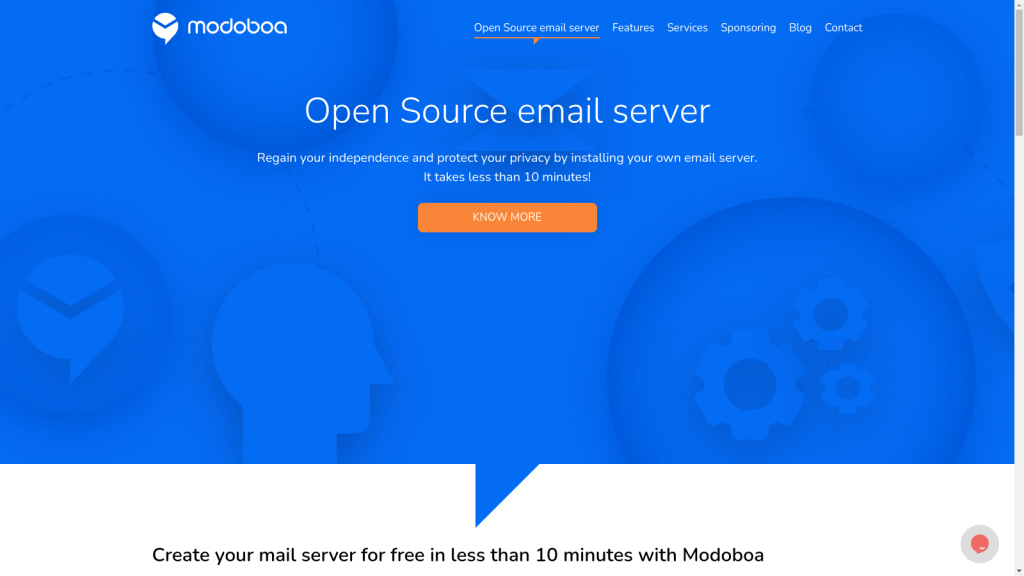
However, there is a growing consensus that self-hosting can be a viable option for sending transactional and other notification emails. These emails are typically system-generated and don’t require the same level of inbox placement and deliverability as regular correspondence. Self-hosting in this context can provide more control over the sending process and potentially reduce costs for high-volume senders.Suggested read: Best SMTP Servers for Marketing Emails in 2024 [Detailed Comparison] Suggested read: How to Install Ubuntu Mail Server? [Step By Step Guide]
3. Mailu: Insular Email Distribution
Maintaining and developing the server infrastructure requires substantial technical expertise and ongoing effort. Furthermore, you’ll need to constantly update and manage spam filters and blocklists to protect against unwanted incoming emails, adding to the complexity of server management.James (Java Apache Mail Enterprise Server) is a versatile and modular email server solution built on the Java Virtual Machine (JVM). It offers a comprehensive set of components that allow users to create customized email processing systems. James supports many email protocols, including SMTP, LMTP, POP3, IMAP, ManageSieve, and JMAP, making it a flexible choice for various email server needs.
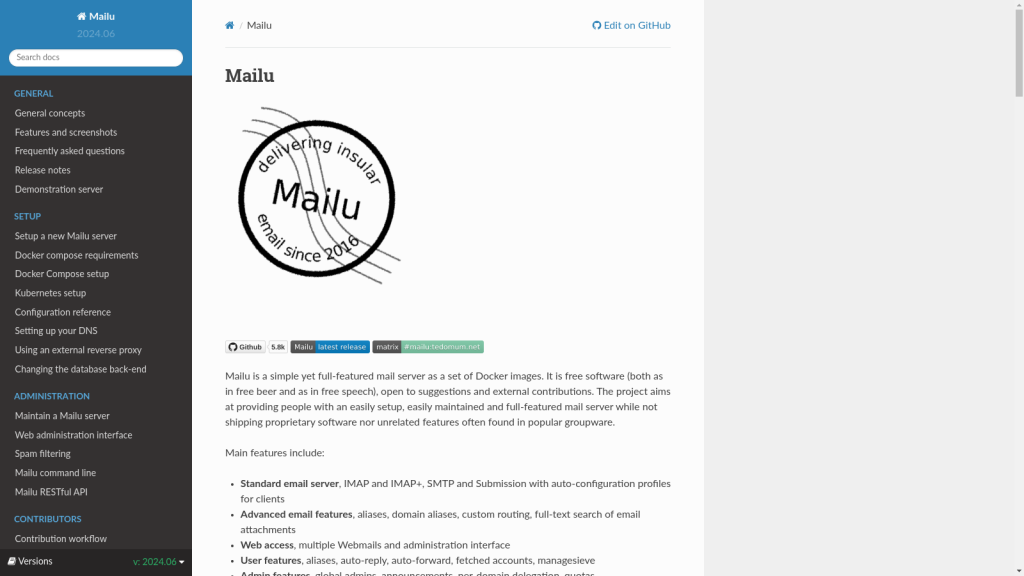
The system includes a web-based administration interface and webmail client, which provide convenient management and access to emails from any device with a web browser. It also contains built-in spam filtering using RSPAMD and antivirus protection with ClamAV. The system prioritizes encryption, using SSL/TLS for all communications to protect sensitive data.But before going there, let’s first discuss the pros and cons of hosting your own email servers…
4. Poste.io
Dovecot Pro supports all major email standards, including IMAP, POP3, LMTP, and Manage Sieve protocols, to ensure smooth mail delivery and retrieval. Advanced security features, such as full encryption of data at rest, OAuth authentication, and integration with OX Abuse Shield, are also supported and offer robust protection against login abuse.The “best” email provider for personal use depends on individual needs. Still, Gmail is often considered top-tier due to its robust features, ample storage, and integration with other Google services. Other popular options include Outlook.com (formerly Hotmail) and ProtonMail for those prioritizing privacy and security.iRedAdmin-Pro, the premium version, significantly expands on the capabilities of the free edition. It offers advanced domain and user management features, including domain-level admins, per-user service control, and self-service options for end-users. The Pro version also includes robust security features such as spam and virus quarantining, detailed throttling controls, and integration with Fail2ban for enhanced protection against malicious activities.For those not looking to self-host, some of the most affordable email providers include Zoho Mail, which offers a free plan for up to five users, and Google Workspace (formerly G Suite), starting at per monthly user. Other budget-friendly options include Bluehost and HostGator, which often include email hosting with their web hosting packages.
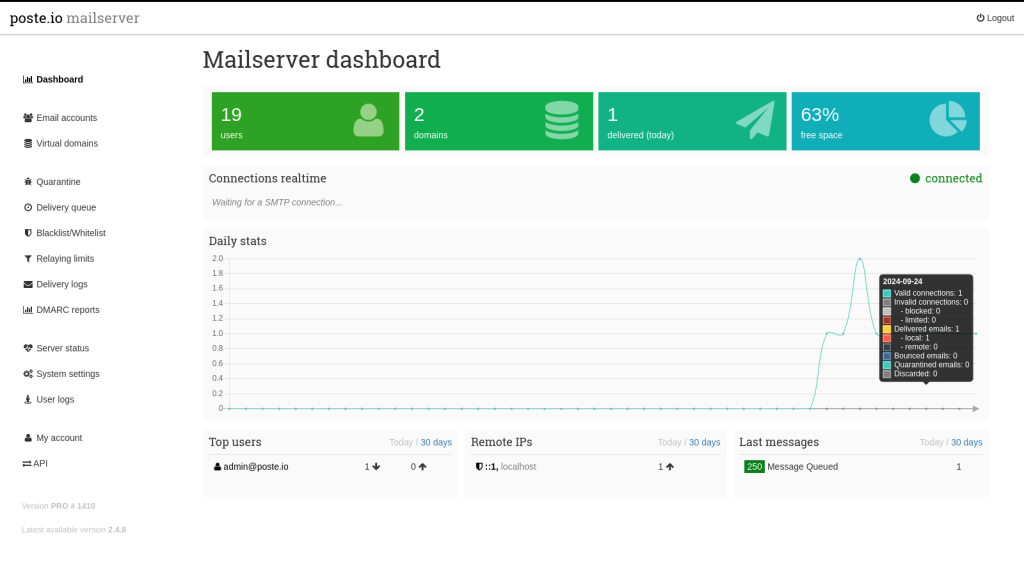
If you are not tech-savvy, you might also enjoy the installation and configuration services Modoboa provides. Although most free tools offer the software and expect you to run it independently, Modoboa has official (paid) support plans to help you resolve your queries.
5. iRedAdmin-Pro
Ultimately, the decision to self-host should be based on carefully assessing your technical capabilities, resources, and specific needs.Sign up for RunCloud today and experience the convenience of automated server management!In this guide, we’ve curated the top self-hosted email tools available to streamline your email experience so you can focus on what truly matters – building your business and engaging your audience.
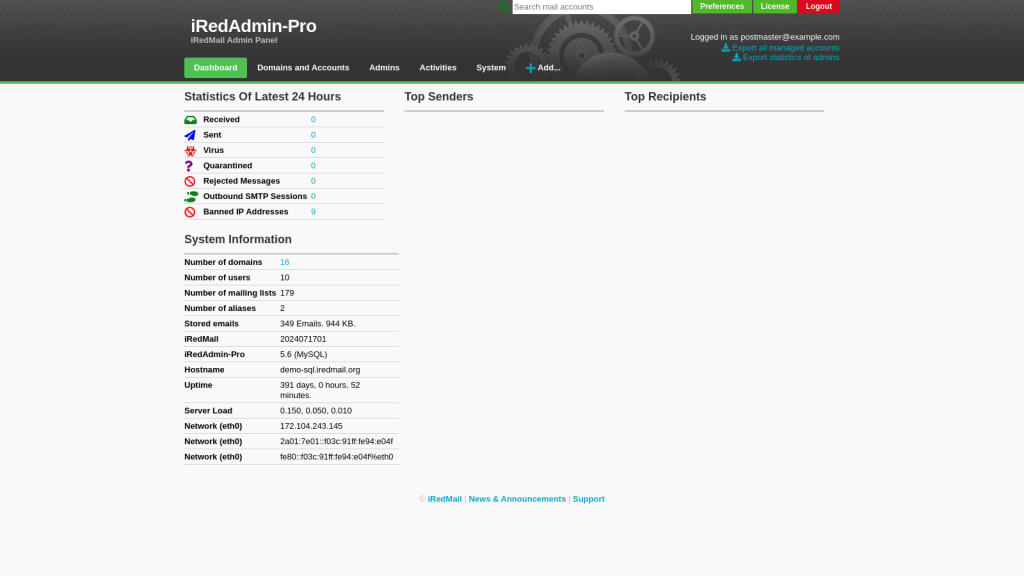
Suppose you do self-host for transactional emails. In that case, experts recommend implementing robust security measures, regularly updating your server software, and closely monitoring your server’s reputation to ensure your emails continue to be delivered successfully.If you’re ready to simplify server management and accelerate your business, try RunCloud. Keila ensures compatibility across devices and clients such as Gmail, Outlook, and Thunderbird, so your emails always look professional, whether recipients are using mobile or desktop devices. The platform also offers privacy-focused robust analytics without unnecessary data collection and even allows users to turn off tracking for maximum privacy.It provides comprehensive features, including webmail access through Roundcube, IMAP/SMTP server support for mobile devices and desktop mail software, and contacts and calendar synchronization via Nextcloud. It also incorporates essential email functionalities such as spam protection, mail filter rules, and automated backups to services like Amazon S3.
6. Mail-in-a-Box
Unlike traditional setups, WildDuck doesn’t use the file system for storage; instead, it separates email content from attachments. This allows it to offer efficient data management by leveraging cost-effective storage solutions such as SATA for attachments and faster SSDs for critical data.Here are the best self-hosted email solutions that you should consider in 2024:
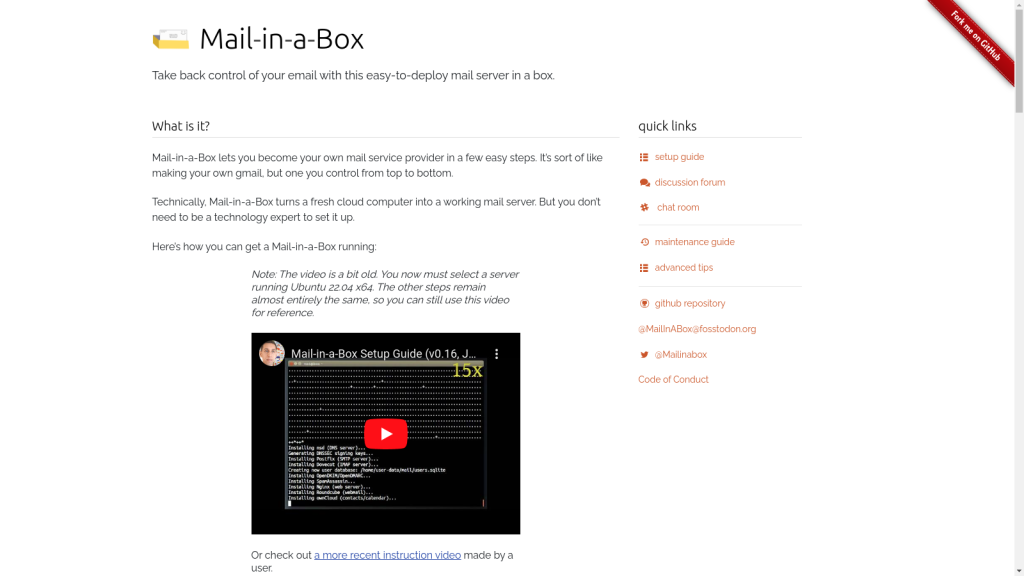
Mailu is another popular open-source mail server solution that uses Docker containers to provide an easily deployable email infrastructure.RunCloud makes it easy to manage your servers with just a few clicks, so you can concentrate on what matters most – your business.
7. Apache James
Additionally, Poste.io offers features such as email redirection, auto-reply capabilities, and quota management, all of which can be controlled through its web interface. Its container-based Docker architecture isolates it from other applications, enhancing overall security and simplifying deployment and management.
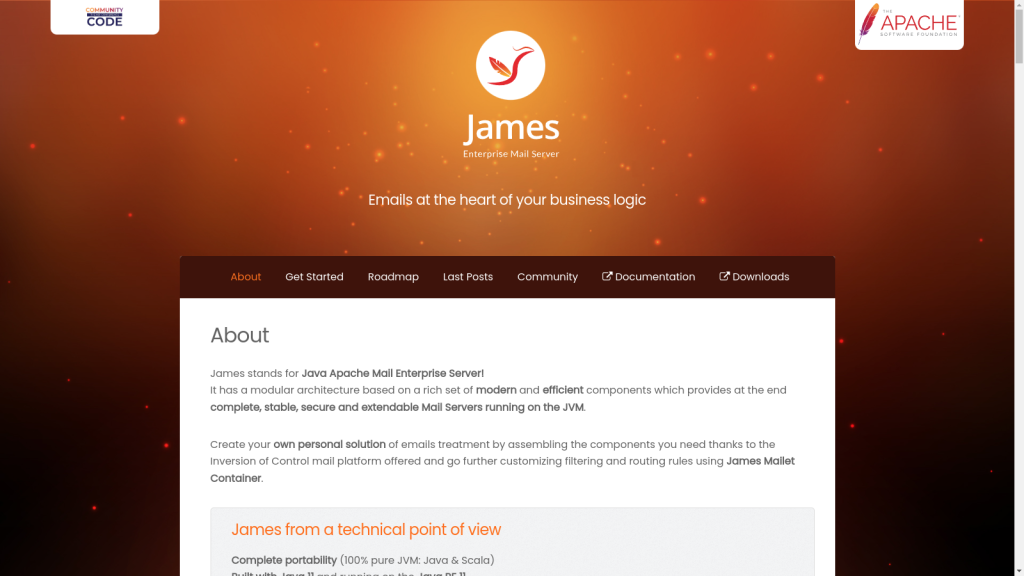
Additionally, you can send as many emails as you want without facing restrictions or extra charges, which is particularly beneficial for businesses with high email volume requirements.Keila is an open-source email hosting server designed to simplify the management and execution of personalized newsletter campaigns. Keila offers users a versatile platform that caters to developers and non-technical users. Its drag-and-drop Block Editor allows for easy visual customization of newsletters, while advanced users can build their designs using MJML or Markdown.
8. Dovecot or Dovecot Pro | Open-Xchange
Modoboa is an open-source email server designed to simplify setting up and managing a personal or organizational email infrastructure. It offers users an alternative to commercial email services and complex self-hosted solutions by providing a user-friendly platform that can be installed in less than 10 minutes.
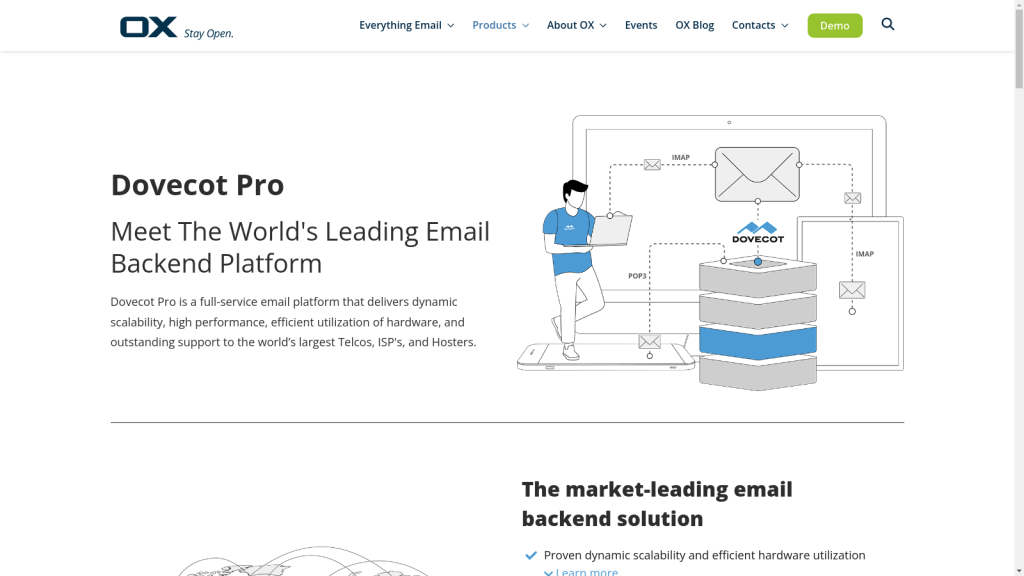
In this post, we’ve provided a comprehensive list of some of the best email hosting and newsletter tools available today, each tailored to meet various needs. Whether you’re looking for open-source flexibility or enterprise-grade performance, these tools should help you make an informed decision.With so many options, from open-source solutions to enterprise-grade platforms, how do you know which is right?
9. WildDuck Mail Server
The cost of hosting your own email server can vary widely depending on your setup and requirements. Generally, you can expect to spend anywhere from to monthly for a basic virtual private server (VPS) to run your email server. Additional costs may include domain registration, SSL certificates, and any premium software or services you use.Poste.io is a great email server solution designed for quick and easy deployment. It offers a full suite of email services, including SMTP, IMAP, and POP3 protocols and antispam and antivirus protection. One of its key features is the ability to set up a fully functional mail server in approximately five minutes, which makes it an attractive option for users who need a robust email infrastructure without the complexity of manual configuration.One of mailcow’s key strengths is its user-friendly web interface, the mailcow UI, which simplifies email server management tasks. This interface allows administrators to easily configure domains, create email accounts, manage spam settings, and handle more complex functions such as DKIM key generation and ARC support.If you want to see the UI, you can log in to the demo mailcow server using the provided credentials.
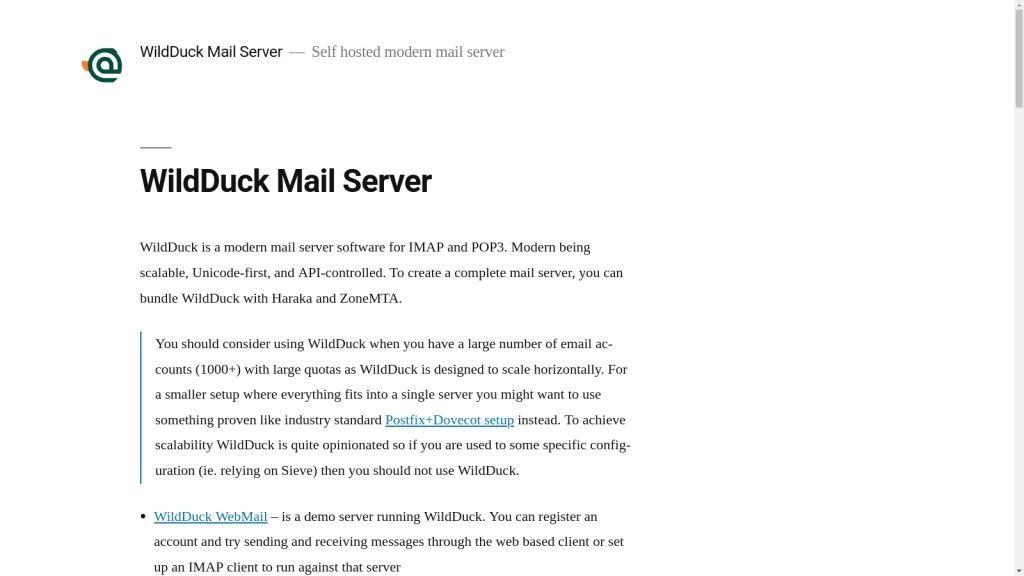
Despite the advantages, self-hosted email servers face challenges in email deliverability, with messages often at risk of being marked as spam by recipient servers.It is written in a memory-safe language and operates without root privileges, eliminating common security risks. Additionally, WildDuck supports multi-factor authentication, application-specific passwords, and user-configured GPG public keys for encrypted storage.
10. Keila
Additionally, iRedAdmin-Pro provides advanced searching capabilities, logging of admin activities, and the ability to export account statistics, making it ideal for organizations that require more control and security in their email infrastructure.Suggested read: How to Send Email from PHP (With Guided Walkthrough)
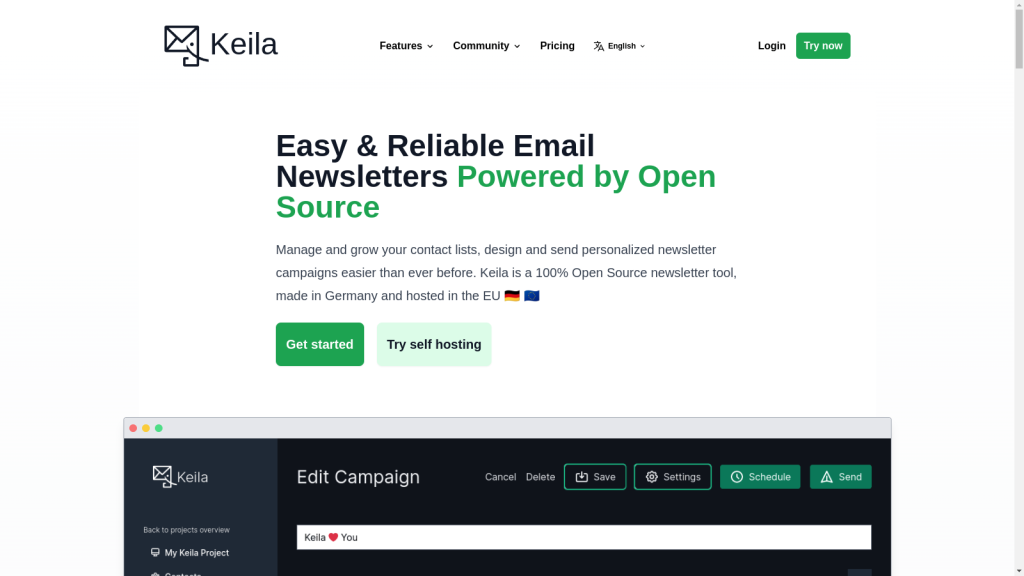
One of James’ key strengths is its modular architecture, which allows users to assemble only the necessary components for their specific use case. This flexibility extends to its storage options, supporting various databases such as Cassandra, PostgreSQL, HSQLDB, MySQL, and OpenSearch.
Should You Self-Host Email Servers?
Suggested read: 15 Best Email Hosting For Small Business (2024) Email servers can be self-hosted or provided by third-party services.It is designed with simplicity and functionality in mind, and offers a full-featured mail server that doesn’t rely on proprietary software or include unnecessary features often found in more extensive groupware solutions. WildDuck is stateless, which enables seamless integration of additional application servers behind a TCP load balancer. This significantly increases throughput without worrying about user-to-server assignment.
Wrapping up
Many email experts strongly advise against self-hosting email servers for primary communication, especially for businesses or organizations that rely heavily on email. The complexities of maintaining a secure, reliable, and spam-free email server often outweigh the potential benefits of self-hosting. Instead, it is recommended to use established email service providers with the resources and expertise to handle email delivery and security intricacies.The free version of iRedMail allows users to set up and manage unlimited mail domains and user accounts. It includes basic features such as mailbox quota control, mailing list management, and a localized web interface in multiple languages.Suggested read: The 19 Best & Most Reliable Transactional Email Services 2023 Additionally, Modoboa offers a range of functionalities typically found in professional email hosting services, including webmail access, calendar and address book management, email filtering rules, and administrative tools, making it a comprehensive solution for those seeking independence from commercial email providers.Modoboa integrates various open-source tools into a single interface, which allows users to create and manage multiple domains, mailboxes, and aliases without the limitations often imposed by traditional email providers.



